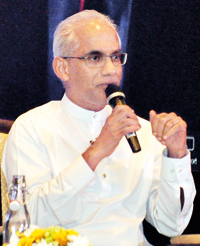Bleak future for logistics in Sri Lanka
Sri Lanka’s shipping industry requires liberalisation and reforms and this requires the support of the people without the constant interference by politicians wanting to secure their political future with jobs for voters. These were the concluding thoughts that highlighted the recurrent problems in the logistics sector that has made Sri Lanka unfavourable in the eyes of the world.

MP Eran Wickramaratne speaks at the conference. Pic by Priyanka Samaraweera.
While some of the panellists at the Fireside Chat session of this week’s Colombo International Maritime and Logistics Conference noted that the reasons for the problems were a small group of shipping agencies others blamed politicians wanting to give jobs to voters; and even others highlighted that trade union activity was rampant that always held the Colombo port to ransom with threats of strike action if demands were not met.
National University of Singapore Associate Professor at Lee Kuan Yew School of Public Policy Razeen Sally said that since 2015 until 2018 he had not seen progress in the logistics sector and there were no serious reforms for which he blamed the President and Prime Minister of that day.
He noted that there was an attempt to liberalise these sectors but it was blocked and reversed by a small group of shipping agencies and “since then Sri Lanka has got worse.” “I see no hope and no future for
Sri Lanka,” Mr. Sally said.
SJB MP Eran Wickramaratne speaking on the occasion said that there is a need to push for reforms and noted that people look at liberalisation and what went wrong and blame the politician.
But reforms need the support of the people, he said adding that the sector looks at the employees in this area but the real stakeholders are the citizens of this country.
He also noted however, that politicians were responsible for the increase in the workforce at the Colombo Port and insisted that governments should not have 100 per cent ownership of institutions. On the contrary they should engage in defence, food security and the like.
Moderator and Founder Chairman, CIMC Events and Shippers’ Academy International Rohan Masakorala highlighted that today investors say “We are not happy with Sri Lanka” and they have lost interest in the country insisting that the protectionist policies adopted are a hindrance. In light of these concerns, Mr. Masakorala queried “whom are we trying to protect?” adding that it was not protectionism that is required but liberalisation.
In fact most speakers pointed out that the utterance of Ports, Shipping and Aviation Minister Nimal Siripala De Silva left everyone confused compared to Foreign Affairs Minister Ali Sabry’s comments that caught the spirit of the event with calls for reforms and progress.
TW Corp Chairman Thilan Wijesinghe wrapped it up well when he said, “We are probably the only country that has done brilliantly well to go back 25 years.”
In fact he pointed out that retaining the East Container Terminal (ECT) is believed to be mainly to provide space for the Ministers to provide jobs to their supporters.
Expolanka Holdings Group CEO Hanif Yusoof said that since the current head of state is very much for liberalisation it is important that he takes the decision in this direction.
| Port sector reforms easier said than done, says Minister | |
| Port sector reforms will take time as privatising ports in Sri Lanka can have its consequences on the government of the day and taking strong decisions will find them being “dictated” to by the West, Ports, Shipping and Aviation Minister Nimal Siripala De Silva said.The minister also the Chief Guest was addressing the inauguration of the Colombo International Maritime and Logistics Conference on Tuesday at the Cinnamon Grand in Colombo. The 2-day conference was based on theme “Connecting Oceans, Creating Value Chains.” No single port in Sri Lanka is totally privatised unlike in other parts of the world and if it happens in Sri Lanka then we don’t know what will happen to the government. In this context we need to move step by step,” the minister said. Minister De Silva asserted that Sri Lanka’s political system and the country’s status as a small island does not allow it to take independent decisions as they will be dictated to by the West and also the government has to give the trade unions their rights. As a result, the country’s economy will be impacted. He noted that while the West Terminal is operated by India’s Adani Group, the East Terminal is now the terminal of the trade unions because in order to retain industrial peace within the port it is being operated by the state. He blamed the business community, pointing out that those with money “go and park it elsewhere” and called on the different sectors to buy ships and those in the maritime industry to invest in the sector. In the 1970s Sri Lanka had 17 ships but today this is down to only two, the minister said. The Minister pointed out that while it is easy for anyone to say what needs to be done, it was not always easy to implement these. Guest of Honour at the event Foreign Affairs Minister Ali Sabry called for more action and insisted that it was now high time the government moved out of engaging in business operations, as over the years it was found not be a fruitful venture. A government should be a facilitator and regulator and allow the private sector to carry out the operations, he said. |
Hitad.lk has you covered with quality used or brand new cars for sale that are budget friendly yet reliable! Now is the time to sell your old ride for something more attractive to today's modern automotive market demands. Browse through our selection of affordable options now on Hitad.lk before deciding on what will work best for you!


